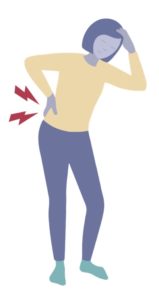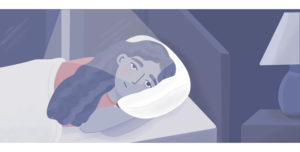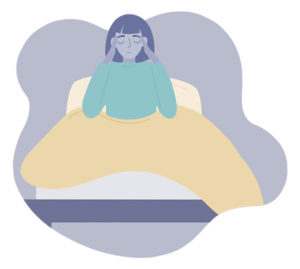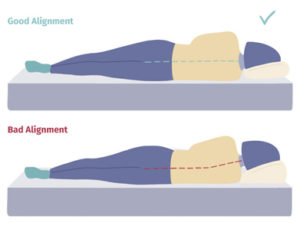Everyone deserves a comfortable night’s sleep, but it doesn’t come so easily to everyone. There are many factors that can disrupt a good night’s sleep, and pain is a big one that can get in the way. For those who have arthritis pain, comfortable sleep can seem nearly impossible.
In this article, we’ll explore the connection between arthritis and sleep, and share some advice for ways you can sleep more comfortably in spite of having arthritis. First, let’s talk a little bit about what arthritis really is.
What Is Arthritis?

Many people think of arthritis as a specific condition, but according to the Arthritis Foundation, it’s actually an umbrella term that includes more than 100 types of joint pain, joint disease, and related conditions. Together, these conditions make up the leading cause of disability in the United States.
Types of Arthritis
We won’t detail all the many types of arthritis in existence, because then you’d be reading this all day! But here’s a quick overview of some of the most common types:
- Osteoarthritis, a degenerative form of arthritis that occurs when the cartilage that cushions the ends of bones wears away, leaving bones to rub against each other and cause pain
- Inflammatory arthritis, in which something goes wrong with the immune system and it attacks the joints, provoking inflammation
- Infectious arthritis, which occurs when a bacterium, fungus, or virus enters the joint(s) and provokes inflammation
- Metabolic arthritis, which occurs when a buildup of uric acid forms pointy crystals in the joint(s), provoking jolts of extreme pain
Specific types of arthritis (which fall into the above categories) include rheumatoid arthritis, psoriatic arthritis, septic arthritis, thumb arthritis, reactive arthritis, juvenile idiopathic arthritis, ankylosing spondylitis, and gout.
The Arthritis Foundation estimates that in the U.S., nearly 60 million adults and 300,000 children deal with some form of arthritis. It’s more common in women and older people.
Over time, arthritis can cause permanent damage to the joints. Some more extreme types of arthritis can also negatively impact the eyes, heart, kidneys, lungs, and skin.
What Are the Symptoms of Arthritis?
As noted above, the term “arthritis” could refer to any of more than 100 joint conditions, all of which are characterized by their own specific set of symptoms. That said, the most common symptoms of all forms of arthritis center around the joints.
While everyone’s experience with arthritis is different, common joint symptoms may include:
- Decreased range of motion
- Pain
- Redness
- Stiffness
- Swelling
These symptoms may be constant or intermittent, and they can vary in intensity over time. Severe arthritis can provoke chronic pain and have a major impact on a person’s ability to engage in daily activities.
What Are the Causes of Arthritis?
Because there are so many different forms of arthritis, the causes of arthritis vary widely.
For instance, osteoarthritis results from damage to the cartilage between bones. Rheumatoid arthritis is caused by a faulty immune system that attacks the synovial membrane around joints. Other forms of arthritis might be caused by injury, infection, genetics, and so on.
Risk factors for arthritis include:
- A family history of arthritis (genetics)
- Advanced age
- Sex (For instance, women are more likely to develop rheumatoid arthritis, while men are more likely to have gout)
- Joint injury
- Obesity
How Does Arthritis Affect Sleep?
It probably won’t come as a surprise that regularly dealing with pain, stiffness, swelling, and mobility issues can interfere with sleep.
In fact, research shows that adults with arthritis are more likely to suffer from insomnia than adults without arthritis. This difficulty sleeping is largely the result of joint pain and its associated limitations. Folks with arthritis who also deal with anxiety or depression were even more likely to experience sleep disturbances. In total, the review found that up to 10.2 million U.S. adults with arthritis suffer from poor quality sleep.

The Arthritis Foundation suggests that number might be even higher, stating that “As many as 80% of people with arthritis have difficulty sleeping” due to achiness, stiffness, pain, and trouble getting comfortable. This helps explain why fatigue is a common side effect of arthritis.
How Does Sleep Affect Arthritis?
Arthritis can negatively impact sleep by making it harder to fall asleep and stay comfortably asleep throughout the night. But this relationship doesn’t only go one way. Sleep (or the lack thereof) can influence arthritis pain and other symptoms in both positive and negative ways.

Per the Arthritis Foundation, poor sleep can exacerbate joint pain during the day. It often increases the risk of becoming disabled and/or depressed, possibly because poor sleep interferes with central nervous system functioning, makes inflammation worse, and diminishes emotional wellbeing.
On a more positive note, high-quality sleep can help muscles recover, reduce fatigue, improve mood, and minimize the perception of pain.
The takeaway? Anyone who deals with arthritis should make it a priority to obtain the highest quality sleep possible in order to more effectively manage their symptoms and help prevent their condition from worsening over time.
Why Does Arthritis Hurt More at Night?
Your arthritis pain could be exacerbated at nighttime for several reasons including the natural night-time decrease in levels of cortisol, an anti-inflammatory hormone, discomfort from your mattress, or increased joint pain from a certain sleeping position that puts pressure on the joints.
What’s the Best Sleeping Position for Arthritis?
Your chosen sleep position matters because it can influence your ability to get and stay comfortable throughout the night—and finding a comfortable position increases the chances that you’ll sleep well. This is true for everyone, and it’s especially true for people with arthritis.
That said, because arthritis can manifest in so many different ways, there is no singular best sleep position for arthritis. The right sleep position for you will depend on the nature of your pain.

For instance, people with back pain might find it helpful to sleep on their side with a pillow between the knees, sleep flat on their back, or sleep on their back with a pillow under the knees. Meanwhile, people with knee pain might find that it’s helpful to lie on their sides with a pillow between the knees or sleep on their back with a pillow under the knees.
Most experts don’t recommend sleeping on the stomach, but if you’re really wedded to this position you might be able to alleviate some pain by placing a small pillow under the abdomen. This helps keep the hips elevated and in line with the spine.
In most cases, proper spinal alignment is very important Fill in any gaps or sags that misalign the spine, and aim to keep a straight line from the head down the neck and spine. It’s important to make sure you’re sleeping on a comfortable mattress that promotes spinal support while minimizing any pressure points. Also make sure that your chosen pillow does the same.

RELATED: Best Pillow for Neck Pain
How to Sleep Better with Arthritis
Investing in a comfortable and supportive mattress that’s well-tailored to your personal needs is step number one when it comes to increasing your chances of sleeping better with arthritis. Beyond that, there are several additional steps you can take to give yourself a better shot at sound sleep. We also consulted with Dr. Bo Babenko, DPT to get his opinion.
- Switch up your sleeping position. Depending on the source of your pain, you may need to switch up your sleeping position. For instance, for people who have arthritis pain in the hips, you probably won’t want to sleep on your side. Instead, try switching over to your back to avoid additional pressure on your pain points. If you are a side sleeper, explore mattresses for side sleepers here.
- Get a new mattress that offers great comfort, support, and pressure relief. Your mattress can play a big role in your comfort while you sleep. Check out our medically-approved list of the best mattresses for arthritis to get started on your search.
- For a cheaper alternative than a mattress, find the best mattress topper for arthritis. You may be able to relieve your pain by adding a mattress topper to your current mattress. The best mattress toppers for arthritis offer many of the same qualities that we’ve talked about when looking for a new mattress. A high-density memory foam topper that’s a few inches thick should be able to offer some additional pressure relief to your current sleep setup.
- Avoid activities that provoke joint pain before bed. If you climb into bed in the middle of a pain flare-up, it’ll be that much harder to fall and stay asleep. Pay attention to the activities that exacerbate your pain, and try to avoid them in the hours leading up to bed.
- Take steps to manage stress. Living with a painful condition can be stressful, and the responsibilities of everyday life can be too. Make sure you’re taking steps to cope with stress in your waking hours so it doesn’t keep you awake at night. This might look like practicing meditation, seeing a therapist, exercising regularly, and so on.
- Exercise on a regular basis. Getting a move on can help reduce stress, strengthen muscles and joints, reduce stiffness, and make it easier to fall asleep at night. Consider low-impact activities such as swimming, walking, cycling, water aerobics, yoga, and so on.
- Create a relaxing bedtime routine. Taking the time to unwind before bed can make it easier to drift off. According to Dr. Babenko, breathwork or some self myofascial release (SMR) as prescribed by a qualified Physio can significantly improve how your nervous system prepares for sleepy time. You can also consider listening to soothing music, taking a warm bath, reading a good book, and so on. (While you’re at it, make sure to avoid stimulating conversations, caffeine, and alcohol in the hours leading up to bed.) Plan to start this routine at the same time each night so your body can fall into the routine.
- Experiment with hot and cold packs. Some people find that heat packs, electric blankets, or cold compresses can help soothe achy joints. It might be helpful to try one of these options while getting ready for bed. Just make sure not to fall asleep with a hot or cold pack on your body or with an electric blanket turned on!
- Practice sound sleep hygiene. Make your bedroom conducive to sleep by keeping it dark, cool, and quiet. Don’t bring electronics into the bedroom, as the blue light they emit can interfere with sleep. Also, steer clear of working or having serious conversations in bed and reserve it for nothing other than sex and sleep.
- Use a sleep tracker. For advice on sleeping better with arthritis, Dr. Babenko adds: “I would also recommend encouraging some kind of sleep tracker similar to Whoop or Oura ring. Even simple apps on the iPhone can help track your quality of sleep and help you determine which changes make the most impact.”
RELATED: Best Orthopedic Mattresses
Overall, Dr. Babenko recommends that you work with your doctor or qualified physiotherapist/health coach to create a routine (and perhaps a medication regimen) that helps you enjoy sound sleep and manage your arthritis symptoms.
Summary
We hope the information in this article is able to offer you some relief, though we would like to remind you we aren’t doctors, and the best pathway to getting pain relief is by working with a medical professional on an individualized plan. Everyone deserves a comfortable night’s sleep, so hopefully taking some of these tips can help you experience better sleep.

